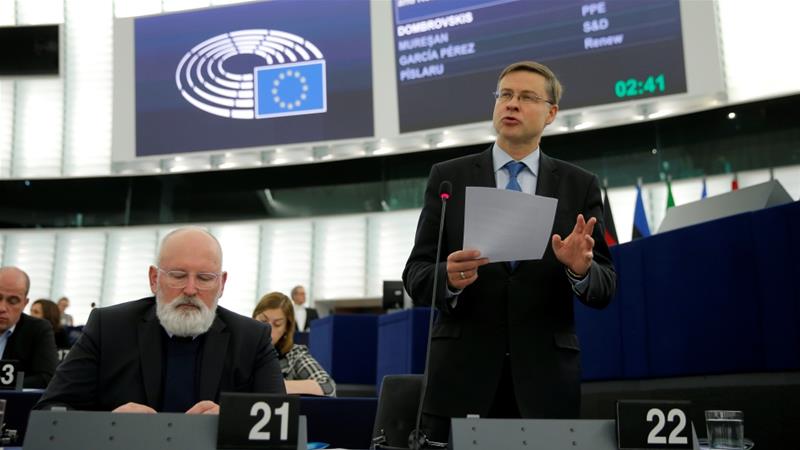In the European Union - as in much of the world - companies are required by law to annually report their financials to a regulatory body.
But the EU's Non-Financial Reporting (NFR) Directive also mandates that corporations publicly disclose environmental, social and governance (ESG) information.
However, new research published on Monday by the Alliance for Corporate Transparency shows that companies are releasing woefully insufficient data on climate and human rights performance.
Implementation of the European law dating back to 2018 has struggled with a lack of specificity on what concrete statistics should be included in NFR disclosures.
Since investors, employees and government agencies all depend on the data, civil society organisations are pressing Brussels to create a better sustainability reporting framework.
This year's research covers 1,000 companies from 11 sectors, up from the 105 companies in three sectors included in the initial research two years ago.
Frank Bold, the Czech Republic-based public-interest law firm whose non-profit wing focuses on corporate accountability, has backed the study with an eye towards enhancing EU legislation and forcing companies to use precise and relevant figures.
"The EU is developing an agenda on sustainable finance. To tackle climate change and transition the economy fast enough, there needs to be a major shift in the way capital markets and banks handle lending," said Filip Gregor, head of the responsible companies section at Frank Bold.
"[Brussels] is taking leading steps in getting this information into actual decision-making. That's the political context," Gregor told Al Jazeera.
"They want to build a standard, define the minimum information that should be disclosed, and pave the way for international development in other countries," he added.
'Boilerplate risks'
Gregor said that all companies regularly publish their key performance indicators about an organisation's finances in a table because that is the clearest way to communicate to stakeholders.
But with ESG data, many companies often just provide qualitative descriptions in text narratives, and the type of information varies between corporations.
A press release accompanying Monday's report said that it was published at the same time that the EU Commission is initiating key reforms and "after [European Commission] Executive Vice President Valdis Dombrovskis announced plans to create EU standards for corporate sustainability reporting".
Hoping to maximise comparability, the goal of metrics is to highlight what risks companies face.
"Companies mostly supply boilerplate risks, with no idea of the time horizon," Gregor said, suggesting that much of the material is created for public relations purposes.
"These results show that mandatory business transparency is a necessary, but insufficient, condition for change," said Phil Bloomer, executive director at the Business & Human Rights Resource Center, which along with groups such as the World Wildlife Fund and Transparency International also participated in the research.
"This assessment adds to the burgeoning evidence that the EU's leadership role in better business needs strengthened transparency regulation and a legal duty of care by companies for their workers, host communities, and the environment," he said in a statement provided to Al Jazeera.
"There is growing support from enlightened companies, investors, parliamentarians and governments, alongside activists," Bloomer added.
"This action would set a level playing field for responsible business and expand legal risk for irresponsible companies if they continue to trash our precious planet, or abuse workers and communities in their supply chains."
Underwhelming numbers
Of the companies in the survey, only 13.9 percent report on whether they are aligned with the 2015 Paris climate agreement's targets for reducing carbon dioxide emissions.
In the energy and resource extraction sector, 23.5 percent of firms report on alignment with Paris goals.
While 53.8 percent of the companies surveyed across sectors recognise the existence of climate-related risks, only 23.4 percent give specific information to help stakeholders understand the specific dangers.
Moreover, only 6.6 percent of companies clearly consider the importance of keeping their emissions aligned with a scenario where global warming is limited to two degrees Celsius.
In addition, just 13.4 percent of financial companies provide details on how their portfolios are exposed to heavy-emitting sectors.
The European Commission is expected to produce a revised sustainable finance strategy later in 2020 that will improve upon the Sustainable Finance Action Plan. It aims to adjust capital flows and mitigate financial risks to the EU's economy from climate change.
Companies in Eastern Europe tend to lag behind in reporting, while Nordic firms often give more specific information.
Even though 88.1 percent of companies report about anti-corruption policies, just one-third say how they are implemented.
While 82.8 percent of companies say that they have a human rights policy, just 22.2 percent give information on due diligence conducted in this area.
More than half of companies acknowledge human rights risks, but only a quarter disclose specific risks of this type. Even smaller fractions report on actual impacts and explain the outcomes of managing those risks.
Just one out of seven companies in the apparel and textile sector disclose information about their ultimate suppliers in high-risk countries for human rights.
SOURCE: Al Jazeera News



